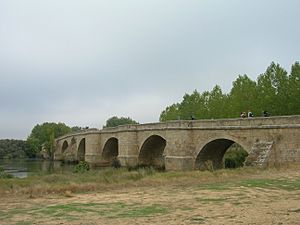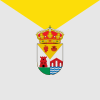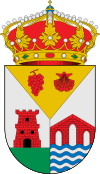Itero del Castillo facts for kids
Quick facts for kids
Itero del Castillo
|
|||
|---|---|---|---|
|
|||
| Country | Spain | ||
| Autonomous community | |||
| Province | |||
| Comarca | Odra-Pisuerga | ||
| Area | |||
| • Total | 17 km2 (7 sq mi) | ||
| Elevation | 783 m (2,569 ft) | ||
| Population
(2018)
|
|||
| • Total | 78 | ||
| • Density | 4.59/km2 (11.9/sq mi) | ||
| Time zone | UTC+1 (CET) | ||
| • Summer (DST) | UTC+2 (CEST) | ||
| Postal code |
09107
|
||
| Website | http://www.iterodelcastillo.es/ | ||
Itero del Castillo is a small and charming municipality located in the province of Burgos, within the Castile and León region of Spain. It's a quiet place with a population of about 78 people, according to the 2018 census.
Contents
Where is Itero del Castillo?
Itero del Castillo is found in the northern part of Spain. It's part of the province of Burgos, which is one of the nine provinces in the large Castile and León region. The municipality is also part of a smaller area called the Odra-Pisuerga comarca.
Geography and Landscape
The village is located at an elevation of 783 meters (about 2,569 feet) above sea level. This means it's quite high up! The total area of the municipality is 17 square kilometers (about 6.5 square miles).
The Pisuerga river is an important natural feature nearby. It flows between Itero del Castillo and a neighboring village called Itero de la Vega.
What is Itero del Castillo Like?
Itero del Castillo is a small community, perfect for those who enjoy quiet village life. The postal code for the area is 09107. Like most of Spain, it uses Central European Time (CET), which is UTC+1. During summer, it switches to Central European Summer Time (CEST), which is UTC+2.
Historical Connections
One of the most notable features near Itero del Castillo is an old bridge. This bridge crosses the Pisuerga river and is known as the puente de Itero.

Right next to this historic bridge, a hospital was built way back in the twelfth century. This hospital was constructed by a person named Nuño Pérez de Lara. Hospitals in those days were often places that offered shelter and care to travelers, especially pilgrims.
See also
 In Spanish: Itero del Castillo para niños
In Spanish: Itero del Castillo para niños
 | Aaron Henry |
 | T. R. M. Howard |
 | Jesse Jackson |



